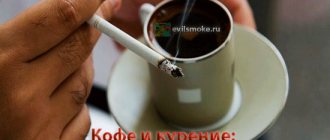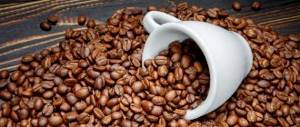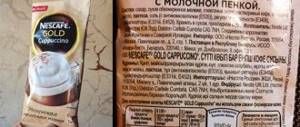Coffee composition
The lower the temperature and duration of roasting coffee beans, the more beneficial properties are preserved. The composition of a drink can be assessed in two categories - its value (nutrients, beneficial microelements) and chemical elements.
Nutritional value (no sugar, cream):
- Fats – 0.7 g;
- Proteins – 0.2 g;
- Carbohydrates – 0.15 g;
- Vitamin PP – 0.5 g;
- Potassium – 0.5-0.9 g;
- Phosphorus – 7 mg;
- Calcium – 5 mg;
- Iron 2-3 mg.
Coffee is low-calorie, with no more than 9 kcal per cup. But on the other hand, it can replenish 20% of the daily requirement of vitamin PP and is a rich source of potassium.
The chemical composition contains over one and a half thousand different elements. Of these, less than half have been studied so far, so coffee will remain an object of research for a long time.
Due to roasting, beans lose a quarter of their moisture; during processing, most of the lipids are lost.
What does it consist of:
- Sucrose, fructose, galactose;
- Organic acids - malic, pyruvic, acetic, caffeic, oxalic, citric;
- Essential oils. They have an antiseptic effect and add aroma;
- Caffeine;
- Trigonelline. Responsible for the richness of taste and pleasant smell;
- Cafeol.
What to do if you overdose on coffee
When poisoned with an invigorating drink, a person’s heart can stop, which will lead to death. To remove an excessive dose of caffeine from the body, basic procedures are required.
Treatment for humans:
- Drink 2 to 3 liters of clean, still water. Caffeine leads to dehydration. To prevent the release of moisture from the body, you need to add 1/2 to 1 teaspoon of table salt per 1 liter of water.
- Place the patient in a horizontal position, providing access to fresh air into the room. This way you can get rid of attacks of nausea and dizziness.
- To reduce your heart rate, it is recommended to eat a banana. The fruit contains a large amount of potassium, which has a beneficial effect on the functioning of the cardiovascular system.
We recommend: Poisoning with seeds (pumpkin and sunflower) - symptoms and treatment
For severe symptoms, treatment is carried out by a doctor. Otherwise, the risk of developing pathologies and death increases.
The benefits and harms of coffee
It provides great benefits with its antioxidants and minerals. But when overdosed, coffee causes no less harm than when it is consumed for contraindications.
Three to five leads to:
- Depression;
- Fatigue;
- Drowsiness;
- Sudden mood swings;
- Irritability and aggression.
Coffee constantly stimulates the nervous system, keeps it in tension, which causes it to become exhausted.
The drink does not replenish fluid deficiency, but serves as a diuretic that dehydrates. Therefore, after a cup of coffee it is customary to drink one or two glasses of water.
If you do not have heart problems, then it will not harm you in any way. The only short-term effect of the drink is an increase in blood pressure, which almost immediately returns to normal.
It greatly affects the functioning of the gastrointestinal tract, increasing the level of acidity in the stomach; an overdose of coffee can cause the development of peptic ulcers and gastritis. Doctors and nutritionists all unanimously say that drinking it on an empty stomach is not recommended.
Coffee contraindications:
- For cardiovascular diseases;
- For nervous disorders and mental disorders;
- In old age and childhood;
- During pregnancy.
Benefit:
- Mitigation of asthma attacks, allergies;
- Helps get rid of toxins, improves the condition of patients who are rehabilitating from alcohol and drug intoxication;
- Decreased blood pressure;
- Increased brain activity, increased performance;
- Reduces the risk of Alzheimer's disease;
- Prevents the development of ovarian cancer in females;
- Reduces the risk of liver disease and oral cancer.
The ambiguity of the drink raises the question - is it possible to die from it? Yes, if the daily intake of caffeine is 10 grams, which is contained in 5-30 liters of drink.
Poisoning with natural and instant coffee
Natural coffee poisoning usually occurs due to an overdose. As an option, if a person usually drinks a weak instant drink, and then decides to drink a large cup of a strong natural one.
It is much easier to get poisoned with instant coffee. It is processed chemically, and the finished powder or granules usually contain up to 15-20% of the original grains. The rest is stabilizers, preservatives, emulsifiers, dyes, starch, synthetic additives, etc. The cheaper instant coffee is, the more dangerous it is to drink, since there is less and less natural product and more and more chemicals.
Decaffeinated coffee is also unsafe. Caffeine is washed out with chemical solvents, which are also present in minimal doses in the finished product. If the coffee is instant, it also contains all the dyes and preservatives described above.
Most often, people get coffee poisoning due to an individual reaction to artificial components or a combination of them. Therefore, you should not get carried away with an instant drink from an unknown brand if you are prone to allergic reactions or have diseases of the cardiovascular system.
You can get poisoned if you usually drink coffee with milk and suddenly drink black coffee.
What dose is safe?
Scientists were unable to establish the exact norm. Everything is conditional - the type of roasting of coffee beans, the type (ground, instant), the individual characteristics of a person - force it to constantly change.
But there are conditional limits. An overdose can occur due to the use of 25 servings of natural and 15 servings of instant. In this case, the amount of caffeine received by the body per day should exceed 100-150 mg of caffeine.
But it is best to limit yourself to 1-3 servings, which will not harm the body due to the high caffeine content.
Symptoms of coffee overdose
Symptoms of coffee overdose are conventionally divided into three phases: early, late, acute.
A deterioration in well-being is noticed within 10-20 minutes after drinking the drink - these are early signs, they indicate that the substances have not yet had time to be absorbed by the intestines and spread through the blood.
It is necessary to act immediately before the late or acute phase occurs. If this happens, call 911 immediately.
Early phase symptoms:
- A rush of blood to the skin causes severe redness of the face;
- Adrenaline increases excitability - all secretions work in enhanced mode. Manifests itself in the form of – excessive sweating, shine in the whites of the eyes;
- Getting hot;
- Trembling is observed in the arms, legs, fingertips, and sometimes throughout the whole body;
- The heart rate increases - this is also the influence of adrenaline and norepinephrine;
- Severe or mild dizziness.
Signs of the late phase:
- Nausea;
- Sweating becomes even more severe;
- Frequent urge to go to the toilet due to intense stimulation of urinary function;
- Disorders of the digestive tract - abdominal pain and cramps, intestinal colic.
Symptoms of the acute phase do not indicate excessive consumption of the drink, but intoxication. It is impossible to do without qualified medical care.
How does the acute phase manifest:
- Insomnia due to nervous disorder
- Nervousness, irritability, the main reason for which is a strong jump in adrenaline in the blood;
- Change in skin tone. It acquires a shade of blue first under the eyes, near the nose;
- Shortness of breath, suffocation;
- Hallucinations, mental confusion. Due to the large amount of adrenaline and norepinephrine, the brain does not perceive reality, distorting it;
- Attacks of headache, high temperature.
Overdose symptoms after drinking large amounts of coffee
If you drink not one, but several cups of espresso in a short period of time, the following symptoms will appear:
- trembling in hands;
- too fast heartbeat;
- the blood vessels of the brain will sharply narrow, you will feel tired, weak, and even fainting is possible (by the way, some people mistake such symptoms for a lack of energy and aggravate their situation by taking another portion of the biostimulant);
- possible diarrhea and nausea;
- dehydration, symptoms of which include dry mouth, confusion and dizziness;
- breathing becomes rapid and shallow, a feeling appears as if there is not enough air;
- a person begins to sweat even without physical activity.
You need to know moderation in everything. If you drink coffee and experience at least one of the above-mentioned sensations, then under no circumstances should you repeat the serving. As already mentioned, often this symptomatology is perceived by people as a demand from the body to cheer up.
Coffee overdose: first aid and treatment
What to do in case of a coffee overdose - sometimes in case of poisoning you can get by with first aid at home.
If all signs of acute intoxication are observed, you need to call a doctor and carry out an emergency measure before his arrival.
How to help the victim:
- Rinse your stomach. After every liter of liquid you drink, artificially induce vomiting;
- Give a sorbent - “Activated carbon”, “Smecta”, “Polysorb”;
- Constantly replenish fluids. Every half hour, drink a quarter glass of clean water;
- If a person is chilling, wrap them up tightly; if the temperature is above 38 degrees, bring it down by wiping with a damp towel.
First aid for poisoning
For mild signs of poisoning, immediate first aid is sufficient:
- Drink 2 liters of clean water.
- Induce vomiting.
- Perform gastric lavage until the vomit becomes clear.
- Drink activated carbon.
- Drink water throughout the day.
In case of poisoning, caffeine is absorbed into the blood, so rinsing will not help. In this case, you must urgently call an ambulance!
- Before the ambulance arrives, take the victim out into the fresh air or provide a ventilated room.
- Reassure the patient: help him breathe deeply.
- Take activated carbon at the rate of one tablet per 10 kg of weight.
- Stay with the victim until the ambulance arrives.
To prevent the danger of coffee overdose, you should limit yourself to 1 cup per day. This dosage is considered harmless to human health.
© Lifeo.ru
Caffeine and sodium benzoate poisoning
Some types of instant, packaged coffee do not use pure caffeine, but caffeine sodium benzoate. Its daily dose should not exceed 300 mg, otherwise you may suffer from intoxication.
Many people are interested in what to do in case of such poisoning - everything is the same as in case of intoxication with a drink with pure caffeine.
During use, it is recommended to avoid a number of drugs -
- "Norfloxacin"
- "Cimetidine"
- "Ciprofloxacin"
Lethal dose of coffee for humans in cups
30 ml of coffee drink contains 70-180 mg of caffeine, which does not negatively affect the condition of the human body. The permitted dosage of coffee is calculated based on a person’s body weight. The lethal dose of coffee in cups is 90 for a woman weighing 60 kg.
Lethal dose of coffee for a person at one time
What is the lethal dose of coffee? 200-300 mg per 1 kg body weight . The drink is prepared in a concentrated form with an unpleasant taste. For this reason, a person is not able to drink a lethal dose of coffee per day at once.
The reaction to the resulting overdose manifests itself in the form of: nausea, vomiting, dizziness, excessive weakness, rapid heartbeat. Each sip worsens your overall health.
You will like the article: “ The benefits and harms of coffee for the human body – natural or instant? ".
Lethal dose of coffee for a teenager
Children are strictly prohibited from drinking coffee and caffeinated drinks. The combination of coffee and energy drinks leads to severe intoxication and increases the risk of death. For a teenager, the permitted dosage is 200-400 mg of coffee. In cups - no more than two per day, but not in a row and not after smoking, alcohol, or energy drinks.
We recommend: Can children and adults eat bananas if they are poisoned?
If a teenager takes a lethal dose of coffee, it is necessary to call an ambulance. Signs of poisoning will be eliminated more quickly in the hospital, reducing the risk of death and negative consequences.











